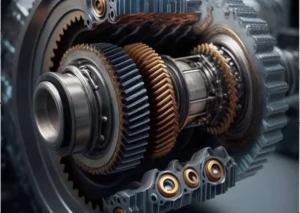Unveiling the Heart of Your Vehicle: Understanding the Transmission

In the intricate symphony of components that make up your vehicle, the transmission plays a vital role as the conductor. Yet, for many drivers, it remains a mysterious and complex part hidden beneath the hood. In this blog post, we’ll shed light on the world of transmissions, exploring their significance, how they work, types, common issues, maintenance tips, and why professional auto service is essential for keeping your vehicle’s gears shifting smoothly.
The Significance of the Transmission
The transmission is significant for several reasons:
- Power Transfer
It facilitates the transfer of power from the engine to the wheels. - Gear Shifting
Transmissions allow your vehicle to change gears for various driving conditions. - Efficiency
Properly functioning transmissions improve fuel efficiency. - Smooth Driving
A well-maintained transmission ensures smooth acceleration and deceleration.
How the Transmission Functions
The transmission operates through various components:
- Gears
Inside the transmission, gears determine the speed and power delivered to the wheels. - Clutch (Manual Transmission)
In manual transmissions, the clutch connects and disconnects the engine from the transmission. - Torque Converter (Automatic Transmission)
Automatic transmissions use a torque converter to manage power flow.
Types of Transmissions
There are two main types of transmissions:
- Manual Transmission
In these transmissions, the driver manually shifts gears using a clutch pedal. - Automatic Transmission
Automatic transmissions shift gears automatically, without driver input.
Common Transmission Issues
Over time, transmissions can encounter problems, including:
- Slipping Gears
Gears slipping or not engaging properly can affect performance. - Transmission Fluid Leaks
Leaking fluid can lead to transmission damage. - Unusual Noises
Strange noises may indicate internal transmission problems. - Delayed or Rough Shifting
Difficulty shifting gears can be a sign of transmission issues.
Maintenance Tips for the Transmission
To ensure your transmission operates optimally, consider these maintenance tips:
- Regular Inspections
Include transmission checks during routine maintenance. - Transmission Fluid Changes
Regular fluid changes are essential for transmission health. - Proper Fluid Levels
Maintain proper fluid levels for smooth operation. - Avoid Overloading
Avoid overloading your vehicle to reduce strain on the transmission.
Why Professional Auto Service Matters
Professional auto service is essential for transmission maintenance and repair because:
- Expertise
Skilled technicians understand transmission systems and related issues. - Diagnostic Tools
Auto shops use specialized tools for accurate inspections. - Quality Parts
Reputable providers use high-quality replacement components. - Safety
Proper maintenance ensures safe and reliable transmission operation. - Preventative Care
Professionals can detect transmission problems before they become major issues.
The transmission is the maestro behind your vehicle’s performance, orchestrating the perfect harmony of power and control. Understanding its significance, recognizing signs of issues, and adhering to maintenance schedules are vital for responsible car ownership. However, entrusting transmission maintenance and repairs to professional auto service providers is the key to ensuring your vehicle’s gears shift smoothly, allowing you to navigate the road with confidence and enjoy a smoother and more efficient journey.











